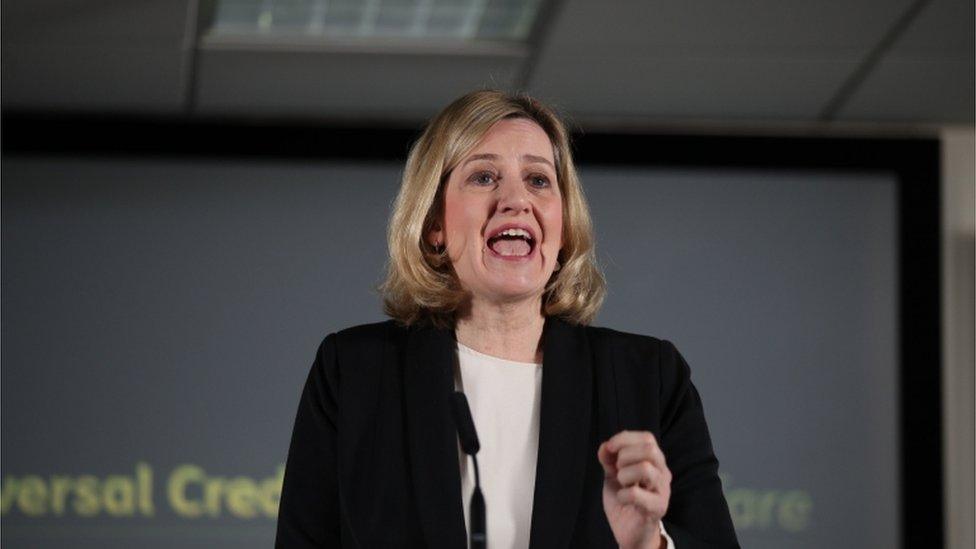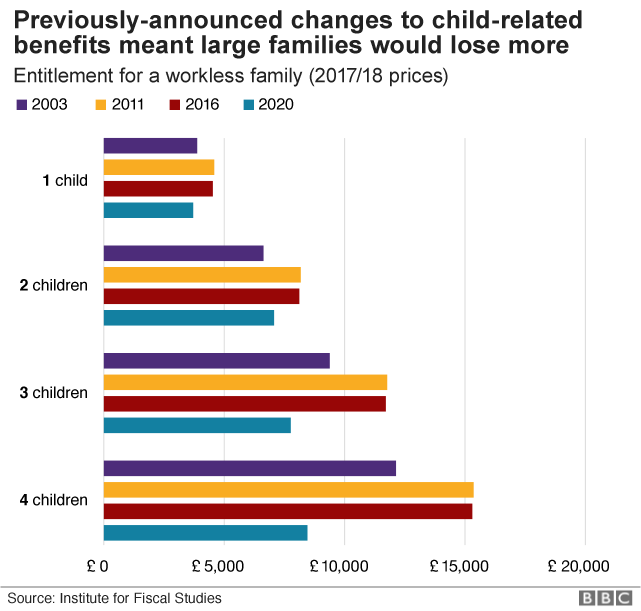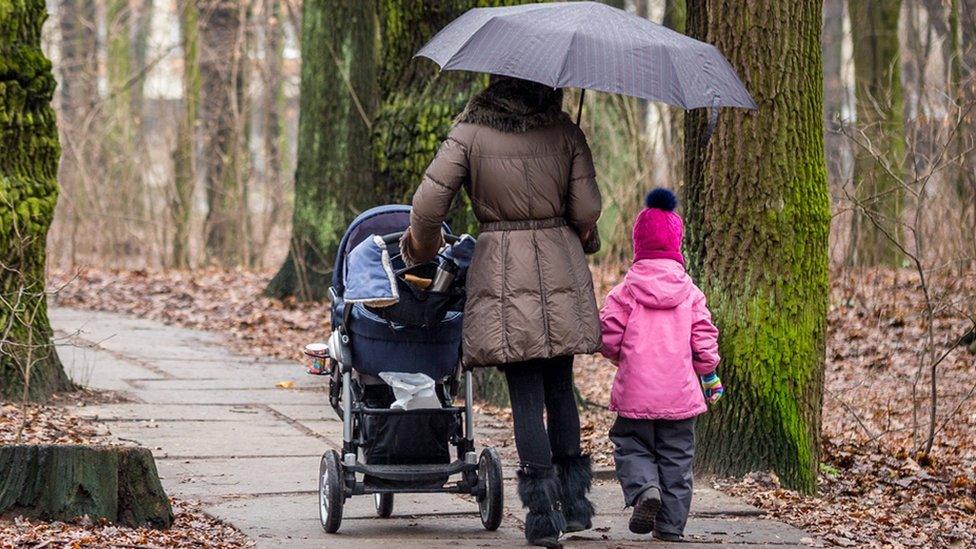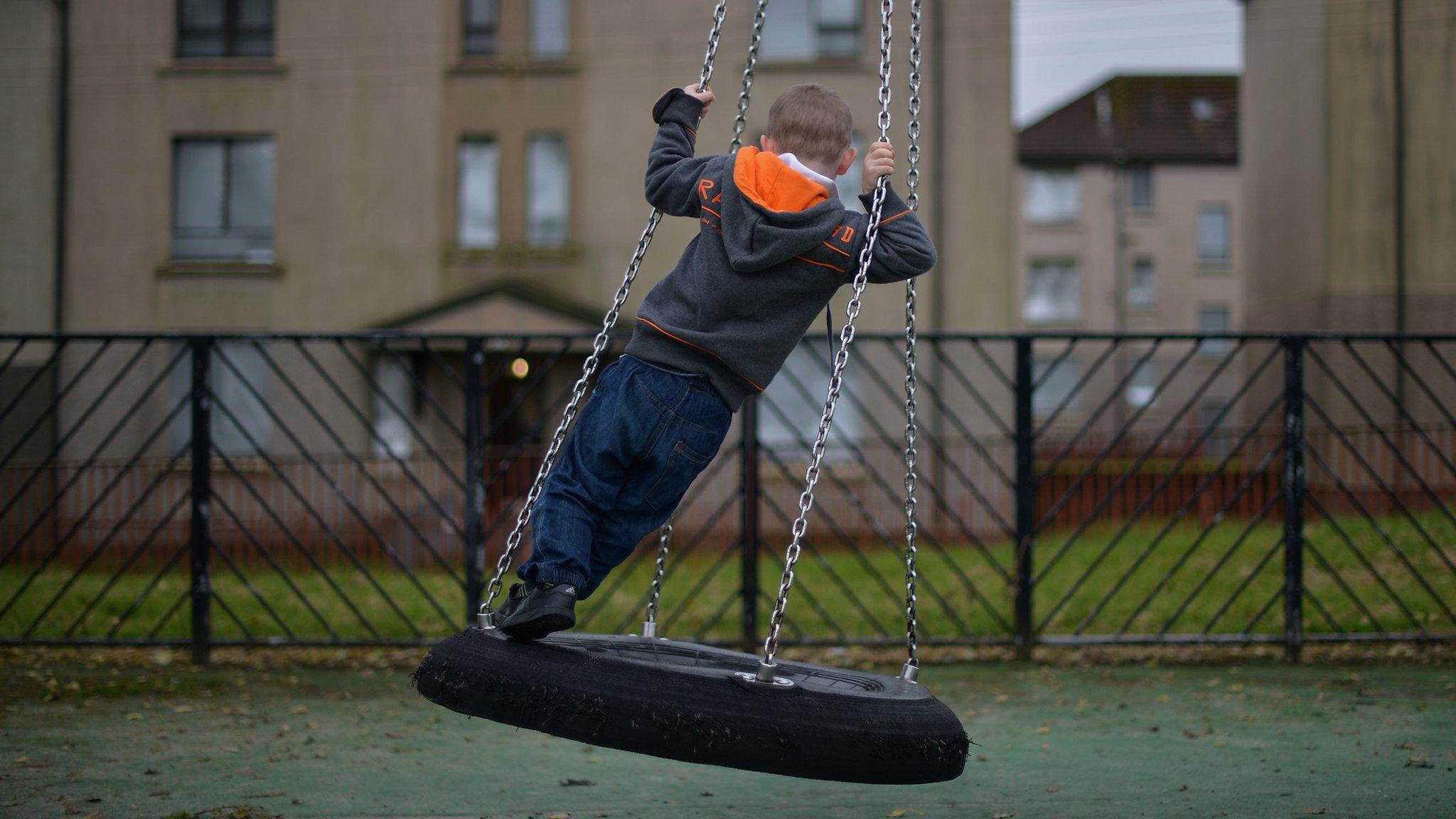Universal credit payment to be given to household's main carer
- Published

Amber Rudd made her first major welfare speech on Friday
Universal credit payments will go directly to a household's main carer in a move which is expected to help more women, Amber Rudd has announced.
The work and pensions secretary also confirmed she would delay asking MPs to allow the transfer of three million people on to the new system until 2020.
And she scrapped plans to extend a two-child benefits cap to families with children born before 2017.
Ms Rudd said she wanted universal credit to be compassionate and fair.
Shadow work and pensions secretary Margaret Greenwood said: "Universal credit is clearly failing and the government should stop the rollout now."
Amber Rudd's speech in London, came as four single mothers won a High Court challenge over the way payments are calculated.
When asked about the court ruling, Ms Rudd said her department would be coming forward with a response.
Will the changes help you? Email haveyoursay@bbc.co.uk, external

Analysis
By Michael Buchanan, BBC social affairs correspondent
This speech was billed as a reset of universal credit, a clear acknowledgment from Amber Rudd that further tinkering with the troubled reform will no longer do.
The last two budgets have seen billions spent trying to reduce the problems that have become ever-more obvious, from increasing use of food banks to private landlords refusing to take people on universal credit.
But this speech demonstrates that Ms Rudd believes a more fundamental assessment of the benefit is needed. That makes her the first work and pensions secretary since Iain Duncan Smith to try to take responsibility for welfare reform rather than simply managing the existing system.
She will need to convince the Treasury in particular to back her judgement.

Speaking in south London, Ms Rudd insisted that the system would still be fully rolled out by 2023 - but added she would consider the findings from a pilot due to run in 2019.
Concerning changes to benefit recipients, Ms Rudd said she recognised claims by charities that the current one payment per household system "penalises women".
Advocacy groups such as Refuge , externaland Women's Aid, external have argued that the system can mean victims of domestic violence are denied access to benefits by their partners.
Ms Rudd said: "Women can never be truly free until they have economic independence".
"That is why I am committed to ensuring that household payments go directly to the main carer, who is usually - but not always - the woman."
She said 60% of payments already go to the woman's bank account but she was looking at ways to ensure the primary recipient of the benefit is the main carer.
Universal credit: Is the government's benefit system working?
Ms Rudd also suggested that the longstanding benefit freeze - which was introduced in 2016 - could finish, saying "it should come to an end" in 2020.
And she said her department would build an online system for private landlords so they can request for rent to be paid directly to them.
Ms Rudd argued this would give landlords "greater certainty" that rent would be paid, and make it easier for tenants in the private sector to keep their homes.
Currently just 5% of private landlords who are paid through universal credit receive the rental payment directly from government.
The minister also said she had asked Job Centre Plus to test how payments to claimants could be made more frequently.
She added that once this had been piloted, frequent payments could be made available "more widely so those in genuine need can take it up more easily".
BBC political correspondent Ross Hawkins said Ms Rudd also remained under pressure to shorten a five-week wait before new universal credit claims are paid.

Ms Rudd's changes only protect families with children born before April 2017. For families where the third child is born after April 2017, the changes have no effect and the impacts the chart is showing still hold
On the two-child limit, Ms Rudd said it was "not right" for it to apply to those who had their children before the cap was announced.
"These parents made decisions about the size of the family when the previous system was the only system in place," she said.
The "child element" of universal credit varies,, external but is worth at least £231.67 a child per month.
The Child Poverty Action Group said the decision was "fantastically good news", but said the two-child cap should be scrapped for all future families too.
Labour also called for the cap to be removed, stressing the change "does not go far enough".
Leading economic research group the Institute for Fiscal Studies said the announcement "makes no difference to the long-run generosity of the benefit system".
"Eventually all children will be born after April 2017, and so the two-child limit will apply to all families with more than two children."
But the IFS added: "What this reform does do is to slow down substantially the speed of the rollout of the policy - its long-run impact will now not be fully felt until the mid-2030s."
Ms Rudd, who became work and pensions secretary in November, accepted there were problems with universal credit, and promised to "learn from errors" and "adjust" the system after taking expert guidance.
Her predecessor Esther McVey had already announced changes to ensure claimants were given more time to switch to the benefit and would not have to wait so long for their money.
The system had been the target of complaints that it was forcing some claimants into destitution and even prostitution.
Struggling with universal credit in Hartlepool
However, Ms Rudd defended universal credit as "a force for good", adding that "it pumps much needed fresh air into a failing system".
"As a nation, I believe we all want a decent safety net: if you're facing a difficult moment in life, the state should be there to help you.
"But it is vital that people are supported by this safety net, not trapped beneath it."
Will the U-turn help you? Or will you and your family still be subject to the cap? Get in touch by emailing haveyoursay@bbc.co.uk, external
Please include a contact number if you are willing to speak to a BBC journalist. You can also contact us in the following ways:
WhatsApp: +44 7555 173285
Tweet: @BBC_HaveYourSay, external
Text an SMS or MMS to 61124 or +44 7624 800 100
Please read our terms of use and privacy policy
- Published11 January 2019

- Published13 May 2024

- Published26 October 2018
